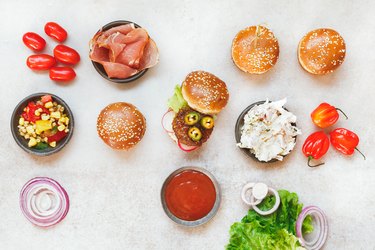
If you feel full all the time, you might be experiencing the early satiety caused by your stomach being slow to empty. Perhaps you can't eat a full meal, or you feel full soon after beginning to eat. Learning more about this condition will help you make wise eating choices.
Video of the Day
Video of the Day
Causes of Early Satiety
Fullness comes from three stages of eating: (1) psychological thoughts about the food, (2) psychophysiological sensations arising from eating the food, and (3) the physiological processes caused by digesting the food. Early satiety can arise from any step in this digestive cascade. Life experiences have given you information about what happens when you eat a particular food. The texture of a food also plays a critical role, according to a October 2012 article in Flavour.
These researchers tested 24 college students and found that thicker foods caused more satiety than creamy foods. The caloric content of the food had no effect on the results. Thus, adding water or air to a food makes it seem more filling even though it doesn't have more nutrients or calories.
The authors of an April 2017 report from the Mayo Clinic focused on the last stage. They believe that early satiety can arise from benign problems like an upset stomach and serious problems like pancreatic cancer. Early satiety can also serve as a warning sign for gastroesophageal reflux disease or a peptic ulcer. If you are experiencing early satiety, speak with a health care expert about your symptoms as soon as possible.
Read more: What to Eat & Not to Eat When You Have an Ulcer
Diseases and Early Satiety
Early satiety might also be a warning sign of diabetes. The authors of an August 2015 paper in Gastroenterology tested 78 people with type 1 diabetes and found that half of the patients had slow gastric emptying. These patients also showed elevations in the marker for diabetes HbA1c.
Similar results occur in people with type 2 diabetes, according to a July 2016 report in the International Journal of Health Sciences. About 11 percent of these patients had slow gastric emptying. They also had uncontrolled diabetes symptoms including elevated blood sugar.
People often associate early satiety with overeating, but anorexic patients can have this symptom as well. The writers of a March 2015 article in the Journal of Eating Disorders explained this paradox. Once your weight falls 15 to 20 percent below ideal, your stomach will empty more slowly.
In addition to early satiety, your stomach might enlarge under these conditions. People often increase their fiber intake to combat the associated constipation. Unfortunately, this dietary choice only causes more bloating.
Read more: How Many Calories a Day Is Considered Starving?
Options for Early Satiety
Several options exist for people with early satiety. The writers of a September 2012 paper in Diabetes, Metabolic Syndrome and Obesity suggested eating frequent, small meals featuring abundant liquids. Such meals should contain low fiber and low fat. You also should avoid eating bezoar-forming foods like fruit pith, seeds or pits. These foods can form a ball-like mass in your stomach which slows down the digestive process.
Changing your chewing habits can help as well. For example, you should more thoroughly chew your food. The authors of a June 2014 report in the Journal of the Academy of Nutrition and Dietetics tested 45 healthy adults and found that the more you chew, the less you eat. Doubling the number of chews should decrease your food intake by almost 15 percent. Making this change will let you avoid early satiety and symptoms like bloating.
Nutritional supplements can help too. The writers of a July 2015 article in Gut and Liver tested 16 healthy volunteers and showed that lipase supplements decreased fullness. This enzyme breaks down 5 to 10 percent of dietary fat. Lipase decreases fullness, but it doesn't address the nausea often associated with early satiety. Fortunately, the authors of a July 2012 review in Supportive Care in Cancer showed that taking 1 gram of ginger each day helps prevent nausea.
- Flavour: "Subtle Changes in the Flavour and Texture of a Drink Enhance Expectations of Satiety"
- Mayo Clinic: "7 Signs and Symptoms Not to Ignore"
- Gastroenterology: "Delayed Gastric Emptying is Associated with Early and Long-Term Hyperglycemia in Type 1 Diabetes Mellitus"
- International Journal of Health Sciences: "Prevalence and Risk Factors of Gastroparesis-Related Symptoms Among Patients With Type 2 Diabetes"
- Journal of Eating Disorders: "Anorexia Nervosa — Medical Complications"
- Diabetes, Metabolic Syndrome and Obesity: "Nutritional Therapy for the Management of Diabetic Gastroparesis"
- Journal of the Academy of Nutrition and Dietetics: "Increasing the Number of Chews Before Swallowing Reduces Meal Size in Normal-Weight, Overweight and Obese Adults"
- Gut and Liver: "Lipase Supplementation before a High-Fat Meal Reduces Perceptions of Fullness in Healthy Subjects"
- Support Care Cancer: "Ginger (Zingiber officinale) Reduces Acute Chemotherapy-Induced Nausea"